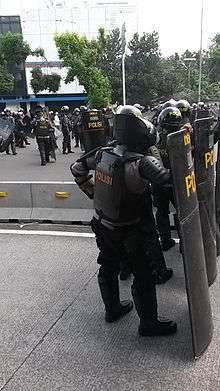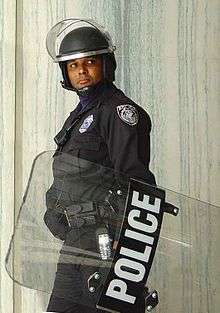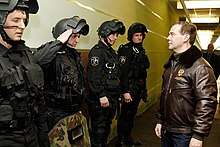Riot police
Riot police are police who are organized, deployed, trained or equipped to confront crowds, protests or riots.

Riot police may be regular police who act in the role of riot police in particular situations or they may be separate units organized within or in parallel to regular police forces. Riot police are used in a variety of different situations and for a variety of different purposes. They may be employed to control riots as their name suggests, to disperse or control crowds, to maintain public order or discourage criminality, or to protect people or property. In some cases, riot police may function as a tool of political repression by violently breaking up protests and suppressing dissent or civil disobedience. In recent decades, observers have noted the increasing militarization of riot and protest policing, with police deploying snipers, flashbang grenades and guns with plastic bullets.
Riot gear

Riot police often use special equipment termed riot gear to help protect themselves and attack others. Riot gear typically includes personal armor, batons, and riot helmets. Many riot police teams also deploy specialized less-than-lethal weapons, such as pepper spray, tear gas, rifles that fire rubber bullets, stun grenades, and Long Range Acoustic Devices.
List of riot police organizations

- Argentina – Policía Federal Argentina D.O.U.C.A.D/ Infantry Guard Corp Gendarmeria Nacional Argentina Prefectura Naval Argentina
- Australia – Public Order and Riot Squad (New South Wales); Public Order Response Team (Victoria)
- Austria – Bereitschaftseinheit Wien of the Federal Police
- Belgium – Directie Openbare Veiligheid (DAS)/Direction Securité Public (DAS) (since 2016)
- Brazil - Rondas Ostensivas Tobias de Aguiar
- Bulgaria – National Gendarmerie Service
- Canada - GI (Groupe Intervention) (SPVM)
- Chile – Unidad de Fuerzas Especiales
- Colombia - ESMAD (since 1999)
- Czech Republic - Public Order Units
- France – Compagnies Républicaines de Sécurité and Escadrons de Gendarmerie Mobile
- Germany – Bereitschaftspolizei units of the state and federal police forces
- Greece – Units for the Reinstatement of Order
- Hong Kong - Emergency Unit, Police Tactical Unit (Special Tactical Squad) and Quick Reaction Force (Hong Kong)
- Hungary – Készenléti Rendőrség
- Indonesia - Mobile Brigade Corps (Brimob)
- India – Rapid Action Force
- Ireland – Garda Public Order Unit
- Israel – Yasam
- Italy - Reparto Mobile Polizia di Stato; Carabinieri (1st and 2nd Carabinieri Mobile Brigades, Multinational Specialized Unit)
- Japan - Riot Police Unit
- Kenya - General Service Unit
- Lithuania - VST - Viešojo Saugumo Tarnyba
- Malaysia – Federal Reserve Unit
- Myanmar - Lon Htein
- Netherlands – Mobiele Eenheid (since 1936)
- Pakistan - Anti-Riot Force, Lahore, Punjab (since 2016)
- Poland - ZOMO (1956 – 1989), OPP - Oddziały Prewencji Policjiã
- Portugal - Corpo de Intervenção | Unidade Especial de Polícia | Polícia de Segurança Pública and Grupo de Intervenção e Ordem Publica/ Guarda Nacional Republicana
- Romania – Trupele de Securitate (1948 – 1989), Romanian Gendarmerie (1893 – 1948 and again since 1990)
- Russia – OMON, National Guard of Russia
- Serbia - Gendarmerie, Policijska Brigada, in extremely tough situations special forces units may be called, such as the Special Anti-Terrorist Unit
- Spain – Grupos de Reserva y Seguridad, Unidad de Intervención Policial
- Singapore – Police Tactical Unit (Singapore)
- Slovenia -PPE SWAT Riot Unit
- South Africa – Public Order Police[1]
- Seychelles - Public Security Support Wing (PSSW)
- South Korea - Combat Police, division of National Police Agency
- Taiwan – Special Police, NPASOG
- Texas (USA) – Texas Ranger Division
- Turkey – Çevik Kuvvet
- Ukraine – Berkut (1992 – 2014), Patrol Police (since 2015)
- United Kingdom - Territorial Support Group (Metropolitan Police area)
- Venezuela - Bolivarian National Guard and Bolivarian National Police
- Vietnam - Mobile Police
See also
- Crowd control
- List of riots
- Mobile Field Force
- Police riot
- Riot control
References
- Rauch, J.; Storey, D. (1998). "The Policing of Public Gatherings and Demonstrations in South Africa 1960-1994". The Commission on Truth and Reconciliation (TRC).